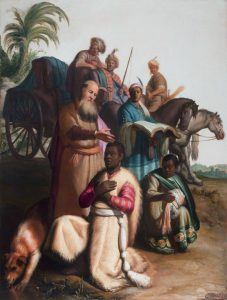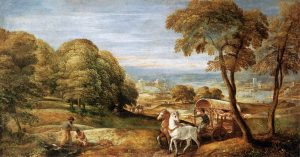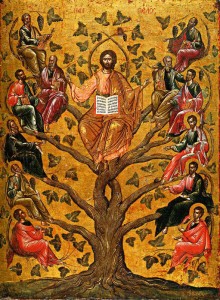Thoughts on Sunday’s Lessons for April 28, 2024 (Easter 5B)

The Baptism of the Ethiopian Eunuch (1626). Oil painting on oak panel by Rembrandt Harmenszoon van Rijn (1606-1669). Museum Catharijneconvent, Utrecht, Netherlands. (Click image to enlarge.)
First Reading: Acts 8:26-40
Hear this assuring message through Sunday’s readings: God’s abiding love is open to all humankind. God showers love upon us as a free gift. The gently humorous story about Philip and the Ethiopian eunuch in the first reading from Acts recounts a reality of the infant church: All are welcome, no matter who they are. Even an Ethiopian eunuch – a foreigner with a high position in a strange land, but barred from full participation in Judaism because his physical condition made him biblically unclean – was eagerly welcomed as an equal. With mutual joy, right there on the spot, Philip baptized him as one of the community.
Psalm: Psalm 22:24-30
This relatively short passage comes from a longer Psalm that begins with the memorable words that Jesus uttered from the cross: “My God, my God, why have you forsaken me?” But the despairing tone of the first two verses quickly turns to the idea we hear in this reading, a statement that resonates with Philip’s warm welcome to the Ethiopian eunuch: God is the ruler of all the world’s nations: those already born and all those yet to come. We live for God, we serve God, we praise God, and we fulfill our vow to God by caring for the poor and feeding the hungry.
Second Reading: 1 John 4:7-21
The verses selected from the first letter of John for this reading both reflect and add to Jesus’ unforgettable promise as told by John the Evangelist: “As the Father has loved me, so I have loved you … love one another as I have loved you.” (We will hear that passage, by the way, in next Sunday’s Gospel.) This reading, like the passage from 1 John that we heard last week, assures us of God’s love, and in doing so it calls us to action. “Love one another” is not just a suggestion: It incorporates a covenant promise. If we can’t love our sisters and brothers, how can we make room in our hearts for God?
Gospel: John 15:1-8
For the remaining Sundays of Eastertide, our Gospel readings will draw from John’s account of Jesus’s long farewell to his disciples at the Last Supper. It might seem odd in the joy of Eastertide to return to Jesus’s last gathering with his apostles before his passion and death, but consider this: Now we celebrate the fulfillment of the promises that Jesus made on that tense and fearful night. In this section, Jesus uses the vineyard as an extended metaphor for our relationship with God through Christ: God prunes the vine’s weaker branches in order to make the remaining vines strong and productive. We must abide in God as God abides in us; otherwise we risk being pruned and discarded like the weaker vines. When we abide in God through Jesus, living in God like a sturdy branch on a nurturing vine, we remain strong and fruitful.



